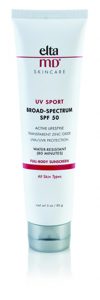J. Gregory Neily, DO
Board Certified Dermatologist, Mohs Micrographic Surgeon
 The month of May is “Skin Cancer Awareness Month” which gives us an opportunity to refocus on keeping us safe from this common form of cancer. Recently, I was at a friend’s gathering and the subject of sunscreen came up. Before long, the same sunscreen myths came up that I find commonly repeated in my practice. Let’s see how well you know your sunscreen.
The month of May is “Skin Cancer Awareness Month” which gives us an opportunity to refocus on keeping us safe from this common form of cancer. Recently, I was at a friend’s gathering and the subject of sunscreen came up. Before long, the same sunscreen myths came up that I find commonly repeated in my practice. Let’s see how well you know your sunscreen.
Here is a quick quiz to test your sunscreen savvy!
TRUE OR FALSE: THE MAJORITY OF SUN DAMAGE
COMES FROM CHILDHOOD
FALSE
It’s true that children are especially susceptible to the sun’s rays as they are outdoors more often, especially when school is out during summer when sun risks are their highest. They also tend to burn more easily. However, recent studies have shown that 23 percent of sun damage occurs under the age of 18. Sun damage happens at every age so it’s never too late to start protecting yourself.
TRUE OR FALSE: SOME SUNSCREEN INGREDIENTS
CAUSE CANCER
FALSE
This falsehood has been spreading rapidly on social media and has some of our patients inquiring about it. There has been a lot of talk about the ingredient, Oxybenzone. Suggesting it can penetrate the skin and effect hormone levels. These unproven claims are not supported by any scientific data. These UVA blocking ingredients are also carefully regulated by the US Food and Drug Administration. In summary, the proven benefits of sunscreen greatly outweigh any unfounded concern of toxicity.
TRUE OR FALSE: EVERY SKIN TYPE NEEDS
SUNSCREEN
TRUE
While some darker complexions do not burn as easily, therefore bringing the risk down, every person is susceptible. In fact, many people of color are diagnosed later in life perhaps because of the myth that they will not burn and are therefore immune and don’t seek skin exams as often.
TRUE OR FALSE: THE HIGHER THE SPF, THE BETTER
FALSE
This is a tricky one. The sun emits both UVA and UVB rays. UVB rays are the main cause of skin cancer. SPF refers to the protection from UVB rays only. While a higher SPF will give a larger percentage of protection, (SPF 15 gives 93 percent while SPF 50 give 98 percent) once the SPF goes beyond 50, the added protection and absorption is minimal. UVA rays, by comparison, cause premature skin aging as well as being linked to skin cancer. You can protect yourself from these rays by using a sunscreen containing a physical barrier ingredient such as zinc or titanium dioxide. Bottom line: The best way to optimize your sunscreen protection is wear a minimum SPF 30 labeled “broad spectrum” which contains a UVA blocking ingredient.
So, how did you do? I hope this helps break down some of the common myths and misconceptions about this very important form of sun protection.
One of the most common questions I get asked is “what sunscreen does a dermatologist wear?” Here are some of my favorite sunscreens from Elta MD. A brand that has quickly become a favorite of both my patients and the office staff!
Elta MD UV
Lip Balm
SPF 31
Many forget about lip coverage in their skin protection routine, but this area is especially vulnerable to sun damage. Throw this in your pocket when you head out for the day and reapply as needed.
To learn more or to purchase these top sunscreen choices, please visit our office or go online to drneily.com
J. Gregory Neily, DO
Dr. Neily is a Board Certified Dermatologist and Mohs Micrographic Surgeon and has been a practicing physician for nearly 30 years. After graduating from Florida State University he received his medical degree from Southeastern University of Health Sciences in Miami, Florida with his dermatology residency training at Western University of Health Sciences in Los Angeles, California.
In 2002, he opened Coast Dermatology and Skin Cancer Center in Venice, Florida to offer Southwest Florida residents the highest level of professional care in an environment that is welcoming and respectful of each patient he treats. He is joined by providers, Amy Murphy, P.A.C.-MMS and Ryan Beadle, P.A.C. Coast Dermatology specializes in diseases of the skin, skin cancer and Mohs Micrographic Surgery as well as cosmetic dermatology.









